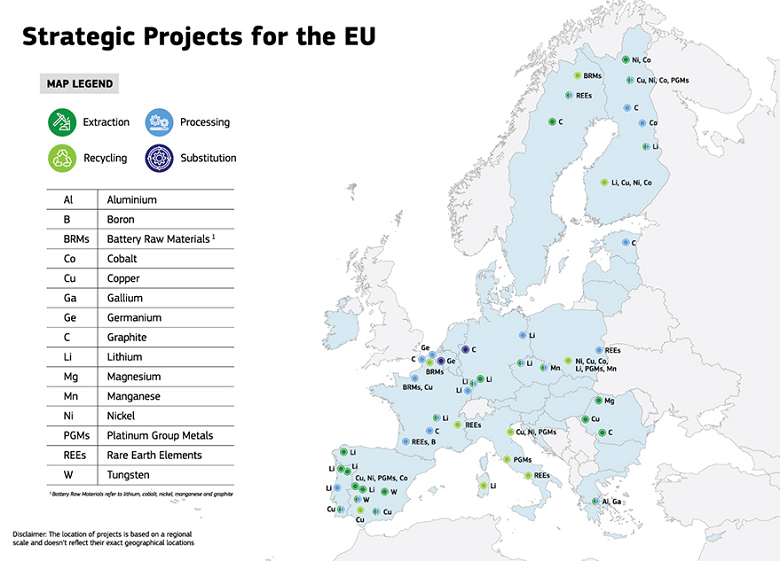Seven Spanish projects selected to boost strategic raw materials in EU

The European Commission will allocate 22.5 billion euros to 47 d strategic projects selected in 13 countries.
The European Commission has launched a strategy to implement the European Critical Raw Materials Act and boost the EU's strategic capabilities in this field. In addition to strengthening the European raw materials value chain and diversifying sources of supply, the goal is to contribute to the green and digital transitions and support European industry, especially in the defence and aerospace industries.
The main goal of this strategy is to ensure that, by 2030 at the latest, the extraction, processing and recycling of strategic raw materials in Europe cover 10%, 40% and 25%, respectively, of demand in the European Union. To achieve this, the EC will allocate 22.5 billion euros to the 47 strategic projects selected in 13 countries. Seven of these are located in Spain.
Location of projects
Among the selected projects in our country, there are four mineral extraction projects, two extraction and processing projects and one recycling project. Two of them in particular will focus on the extraction of lithium, one in Galicia and the other in Extremadura; two others will focus on the extraction of wolfram (also known as tungsten), one of them in Castilla-La Mancha and the other, which also includes its processing, in Extremadura.
Three projects will be developed in Andalusia. One of them will be for the extraction of cobalt, platinum, copper and nickel, and another will involve the extraction and processing of copper. The seventh will focus on the recovery of non-ferrous metals (copper, gold, silver, platinum, palladium and tin) from disused electrical and electronic equipment.
Raw materials value chain
In addition to Spain, the selected projects are located in 12 other countries: Belgium, the Czech Republic, Germany, Estonia, Greece, France, Italy, Poland, Portugal, Romania, Finland and Sweden. Within the raw materials value chain, 25 projects include extraction, 24 processing, 10 recycling and 2 raw material substitution activities.
In total, the 47 projects address 14 of the 17 strategic raw materials identified in the EU act. Among them, lithium, nickel, cobalt, manganese and graphite will particularly benefit the EU battery raw material value chain. Spain, with two of the three d tungsten projects selected, will add value to the defence industry.
Environmental criteria
In addition to boosting EU industry and contributing to the secure supply of strategic raw materials, these projects meet environmental, social and governance criteria and are technically feasible. The overall investment foreseen is 22.5 billion euros. The call for proposals was opened on the same day as the entry into force of the EU Critical Raw Materials Act, 23 May 2024.
EC Executive Vice-President for Prosperity and Industrial Strategy Stéphane Séjourné, said, "Raw materials are at the front end of our most strategic supply chains. They are also key for the decarbonisation of our continent. But Europe is currently dependent on external countries for many of the raw materials it needs most."
For this reason, he said, "we need to increase our own production, diversify our external supply and build up reserves. Today, we have identified 47 new strategic projects which, for the first time, will help us to secure our own internal supply of raw materials. This is a historic moment for Europe's sovereignty as an industrial power."
Photo: European Commission




